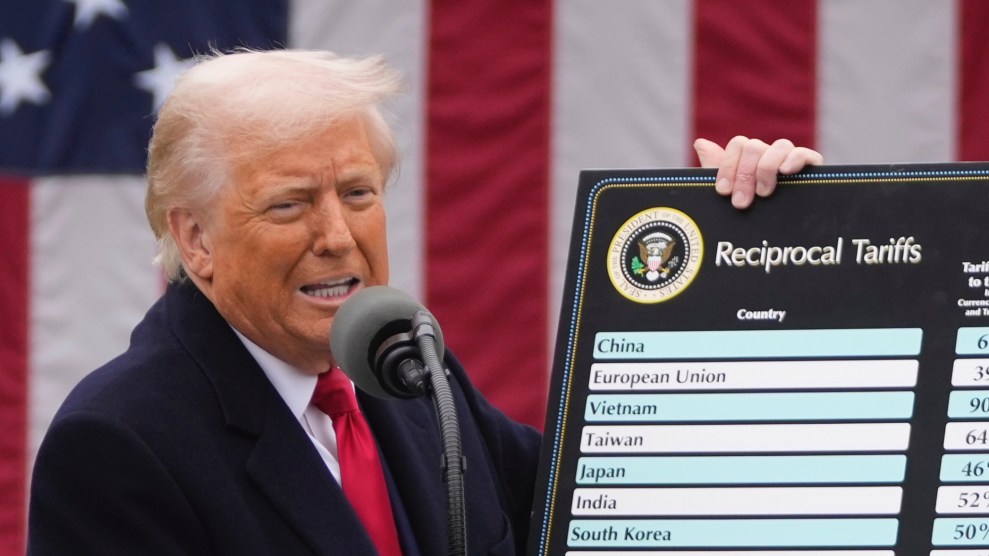Politics
Trump Acknowledges Tariffs Contribute to Rising Food Prices

President Donald Trump has recognized that his administration’s tariffs contribute to rising food prices, a notable shift from his previous assertions. On November 3, 2023, the Trump administration announced exemptions for a variety of grocery items—including essential goods like beef, coffee, and bananas—from tariffs imposed earlier this year. This move appears aimed at addressing the significant financial strain many American consumers are experiencing.
The announcement follows a challenging period for the Republican Party, which has faced recent electoral setbacks in various gubernatorial and local races. Just weeks prior, GOP candidates suffered defeats in both the Virginia and New Jersey elections, while Zohran Mamdani, a democratic socialist, won the New York City mayoral race on a platform focused on affordability.
In a bid to reshape the narrative surrounding economic conditions, Trump recently discussed affordability during an appearance on Fox News, describing it as a “new word” promoted by Democrats. While he insisted that his administration had successfully brought prices “way down,” he admitted that Republicans have not adequately addressed affordability issues. Later that evening, he reiterated this sentiment on Truth Social, stating, “AFFORDABILITY is a Republican Stronghold. Hopefully, Republicans will use this irrefutable fact!”
Despite Trump’s claims, inflation has remained a pressing concern. While federal data indicates that inflation has decreased from its peak in 2022, grocery prices have continued to rise. According to statistics from September, prices for food items have increased at their fastest annual rate since 2022. An August poll conducted by AP-NORC revealed that over half of Americans consider the cost of groceries a “major source of stress” in their lives.
Throughout his presidency, Trump has consistently contended that tariffs do not elevate consumer prices. Nevertheless, the decision to roll back some tariffs on food products suggests otherwise. “We just did a little bit of a rollback on some foods, like coffee as an example, where the prices of coffee were a little bit high. Now they’ll be on the low side in a very short period of time,” Trump stated to reporters on Friday. Over the past year, coffee prices have surged by 19 percent, partly due to tariffs imposed on Brazilian imports, which were set at 50 percent.
Public sentiment regarding Trump’s economic policies appears critical. An October poll conducted by CNN found that less than one-third of Americans believe Trump has fulfilled his affordability promises. Additionally, more than 60 percent of respondents indicated that they feel his policies have worsened the nation’s economic conditions.
As Trump navigates the complex landscape of economic messaging in the wake of electoral losses, his recent admission regarding tariffs may signal a shift in strategy aimed at addressing the growing concerns of American consumers.
-

 Science4 weeks ago
Science4 weeks agoInterstellar Object 3I/ATLAS Emits Unique Metal Alloy, Says Scientist
-

 Science4 weeks ago
Science4 weeks agoResearchers Achieve Fastest Genome Sequencing in Under Four Hours
-

 Politics1 month ago
Politics1 month agoAfghan Refugee Detained by ICE After Asylum Hearing in New York
-

 Business4 weeks ago
Business4 weeks agoIconic Sand Dollar Social Club Listed for $3 Million in Folly Beach
-

 Health1 month ago
Health1 month agoPeptilogics Secures $78 Million to Combat Prosthetic Joint Infections
-

 Business1 month ago
Business1 month agoMcEwen Inc. Secures Tartan Lake Gold Mine Through Acquisition
-

 Lifestyle1 month ago
Lifestyle1 month agoJump for Good: San Clemente Pier Fundraiser Allows Legal Leaps
-

 Science1 month ago
Science1 month agoMars Observed: Detailed Imaging Reveals Dust Avalanche Dynamics
-

 Health4 weeks ago
Health4 weeks agoResearcher Uncovers Zika Virus Pathway to Placenta Using Nanotubes
-

 World1 month ago
World1 month agoUS Passport Ranks Drop Out of Top 10 for First Time Ever
-

 Entertainment1 month ago
Entertainment1 month agoJennifer Lopez Addresses A-Rod Split in Candid Interview
-

 Business1 month ago
Business1 month agoSan Jose High-Rise Faces Foreclosure Over $182.5 Million Loan









